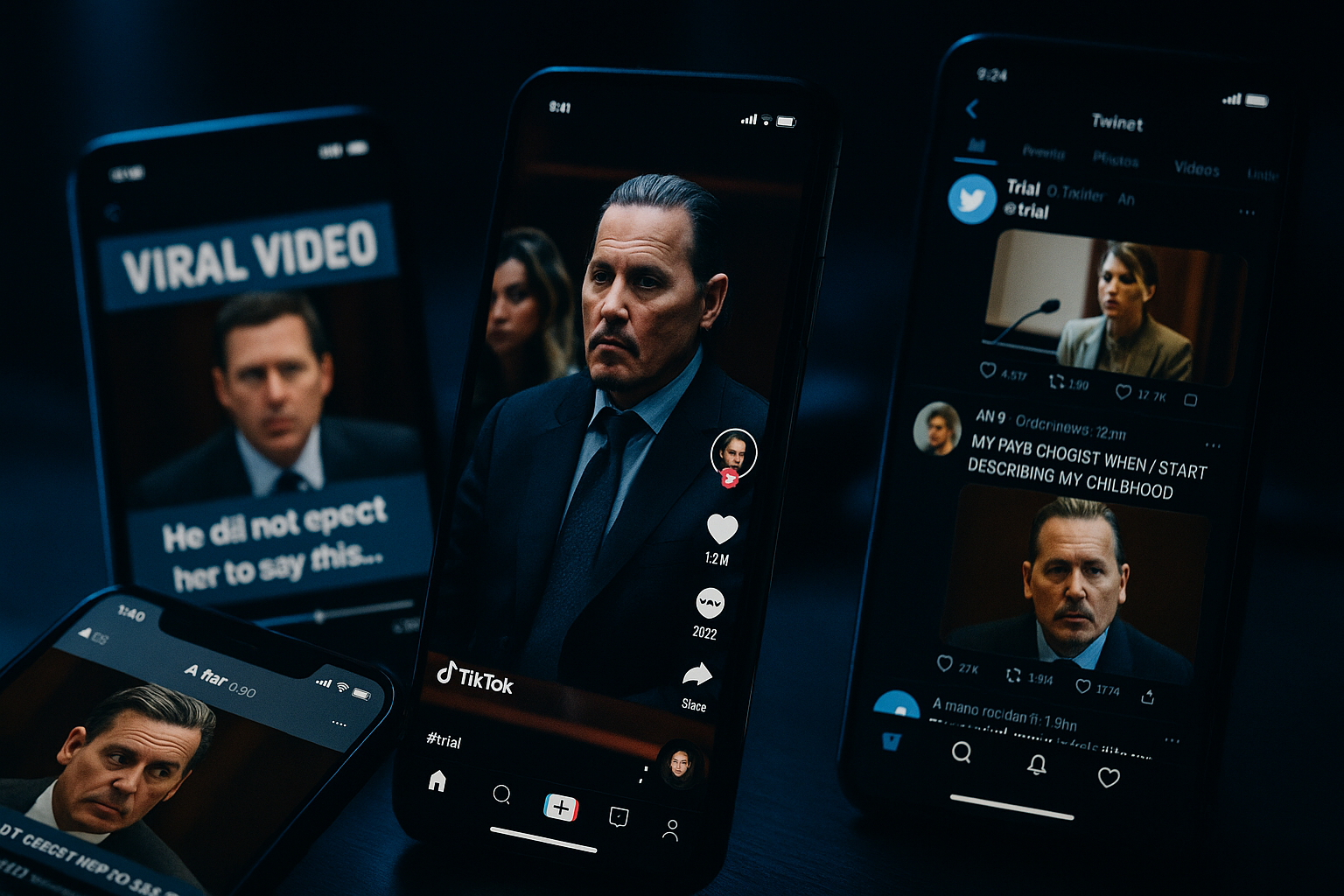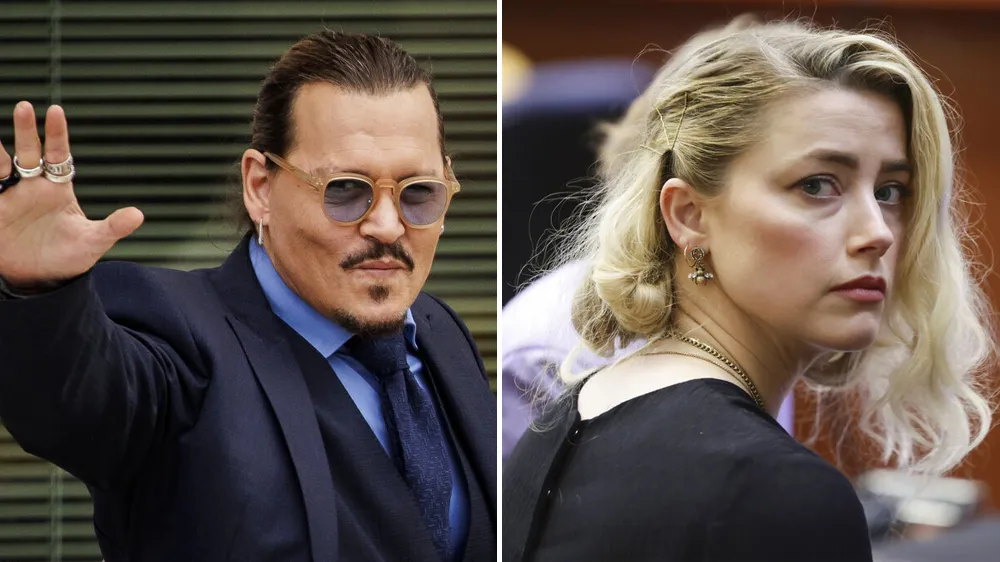The gavel fell on June 1, 2022, but the reverberations of Johnny Depp v. Amber Laura Heard continue to echo through our digital landscape. What began as a defamation lawsuit in Fairfax County, Virginia, transformed into something unprecedented: a six-week global media spectacle that fundamentally altered how we consume justice in the digital age.
The numbers alone tell a staggering story. Over 21.6 billion views flooded TikTok under the hashtag #JusticeForJohnnyDepp, while Law&Crime Network’s YouTube coverage drew record-breaking audiences, with millions tuning in daily to watch the proceedings unfold in real-time. This wasn’t just a trial—it was the birth of “Trial by TikTok,” where public opinion was shaped not by legal arguments, but by viral moments and algorithmic amplification.
The Digital Colosseum

The Depp-Heard trial represented a seismic shift in how celebrity legal battles are consumed by the public. Unlike previous high-profile cases, this courtroom drama unfolded in an era of ubiquitous livestreaming and social media virality. The Virginia courthouse became a digital colosseum where every gesture, every objection, and every tear was dissected by millions of amateur legal analysts.
According to research by Cyabra, 11% of the online conversation surrounding the trial was driven by fake accounts—nearly four times the typical rate for average online discussions. This artificial amplification created an echo chamber that overwhelmingly favored Depp, with #JusticeForJohnnyDepp accumulating over 20 billion views compared to just 80 million for #JusticeForAmberHeard.
The trial’s reach extended far beyond traditional legal coverage. Twitch streamers garnered 26.7 million hours watched as they provided real-time commentary, turning legal proceedings into entertainment content. The hashtag #AmberTurd, referencing allegations about defecation in the couple’s shared bed, accumulated over 4.4 billion views, demonstrating how the most salacious details became viral currency.
The Anatomy of a Media Circus
The transformation of this defamation case into global entertainment can be traced to several key factors that converged in 2022. Virginia’s permissive filming laws allowed unprecedented access to courtroom proceedings, while the COVID-19 pandemic had already normalized livestreaming as a primary form of entertainment consumption.
The Power of Parasocial Relationships
Johnny Depp’s decades-long career as Captain Jack Sparrow and other beloved characters created powerful parasocial relationships with audiences worldwide. When faced with competing narratives about domestic abuse, millions of fans chose to believe in the fictional hero rather than confront uncomfortable realities about their idol.
Media monitoring platform NewsWhip reported that from April 4 to May 16, 2022, the trial generated more average social interactions per published article than President Biden, the Supreme Court’s leaked abortion decision in Dobbs v. Jackson, and the ongoing Russia-Ukraine war. This statistic reveals how celebrity drama can eclipse even the most significant political and global events in our attention economy.
Algorithmic Amplification of Bias
Social media algorithms, designed to maximize engagement, naturally amplified the most emotionally charged content. Depp’s charismatic courtroom moments—his half-smiles, candy-sharing with attorney Camille Vasquez, and witty responses—were perfectly suited for viral consumption. Meanwhile, Heard’s emotional testimony was recontextualized through memes and mockery, with users creating compilations set to the Curb Your Enthusiasm theme song.
The Ten Moments That Defined the Spectacle
The trial’s transformation into entertainment can be traced through specific viral moments that transcended legal significance to become cultural touchstones:
1. “Mutual Abuse” Testimony
Clinical psychologist Dr. Laurel Anderson’s description of the relationship as “mutual abuse” provided a framework that allowed audiences to view both parties as flawed, while still maintaining sympathy for Depp.
2. The “Burn Amber” Text Messages
Depp’s 2013 text exchange with Paul Bettany, including messages like “Let’s burn her” and “Let’s drown her before we burn her,” became viral content when Depp dismissed them as “irreverent and abstract humour” based on Monty Python sketches.
3. Competing Psychological Diagnoses
The battle between Dr. Shannon Curry’s diagnosis of Heard with borderline and histrionic personality disorders versus Dr. Dawn Hughes’ PTSD diagnosis became a proxy war for public opinion about domestic abuse credibility.
4. The “Monster” Narrative
Heard’s description of Depp’s violent alter ego as “the Monster” was reframed by Depp as merely “a phrase he used to mollify his then-wife” to avoid conflict—a response that resonated with audiences as evidence of manipulation.
5. Substance Abuse Revelations
Testimony about Depp’s alcohol and drug use, including incidents where he “passed out in the sand in front of his son,” was overshadowed by viral moments of his courtroom demeanor.
The Verdict and Its Aftermath
On June 1, 2022, the jury awarded Depp $10 million in compensatory damages and initially $5 million in punitive damages (reduced to Virginia’s statutory cap of $350,000). Heard received $2 million on her countersuit. But the real verdict had already been delivered by social media weeks earlier.
The trial’s conclusion marked a watershed moment in the intersection of justice and entertainment. Heard’s post-trial statement about receiving “hundreds of death threats regularly” highlighted the human cost of viral justice, while Depp’s career rehabilitation demonstrated the power of public opinion in the digital age.
The Lasting Impact on Legal Proceedings
The Depp-Heard trial has fundamentally altered how high-profile legal cases are conducted and consumed. Legal experts now warn about the need for more robust jury selection processes, enhanced social media monitoring, and stronger court orders regarding online commentary during trials.
According to the American Bar Association, attorneys must now consider hiring sophisticated teams to monitor social media traffic during trials, potentially using online sentiment to shape legal arguments—a development that raises serious ethical questions about the integrity of the judicial process.
The case has also sparked discussions about courtroom transparency versus justice. While public access to legal proceedings serves democratic principles, the Depp-Heard trial demonstrated how livestreaming can transform courtrooms into entertainment venues, potentially compromising the pursuit of truth.
Cultural Implications: When Celebrities Hijack Justice
The trial’s cultural impact extends far beyond its legal ramifications. It demonstrated how celebrity cases can eclipse critical political issues in public discourse, diverting attention from pressing social problems to focus on the personal dramas of the wealthy and famous.
Research indicates that the trial’s massive social media presence created a “community of shared interests” around celebrity gossip, but at the cost of meaningful engagement with domestic violence issues and legal reform.
The case also highlighted the gendered nature of online harassment, with Heard facing disproportionate vitriol compared to Depp. This pattern reflects broader societal attitudes toward women who speak out about abuse, particularly when their accusations target beloved male celebrities.
The Future of Justice in the Digital Age
As we move forward, the Depp-Heard trial serves as both a cautionary tale and a preview of our digital future. The democratization of legal commentary through social media has created new forms of public participation in justice, but it has also introduced unprecedented opportunities for manipulation and bias.
The trial’s legacy lies not in its legal precedents, but in its demonstration of how algorithmic amplification can override judicial process. When TikTok views become more influential than courtroom evidence, we must question whether we’re witnessing the evolution or the erosion of justice in the digital age.
The gavel may have fallen on June 1, 2022, but the questions raised by this unprecedented media spectacle continue to reverberate through our legal system, our media landscape, and our collective understanding of truth in the age of viral justice.
The Johnny Depp vs. Amber Heard trial represents a pivotal moment in the intersection of celebrity culture, social media, and legal proceedings. As we continue to grapple with the implications of this digital transformation of justice, one thing remains clear: the courtroom will never be the same.

